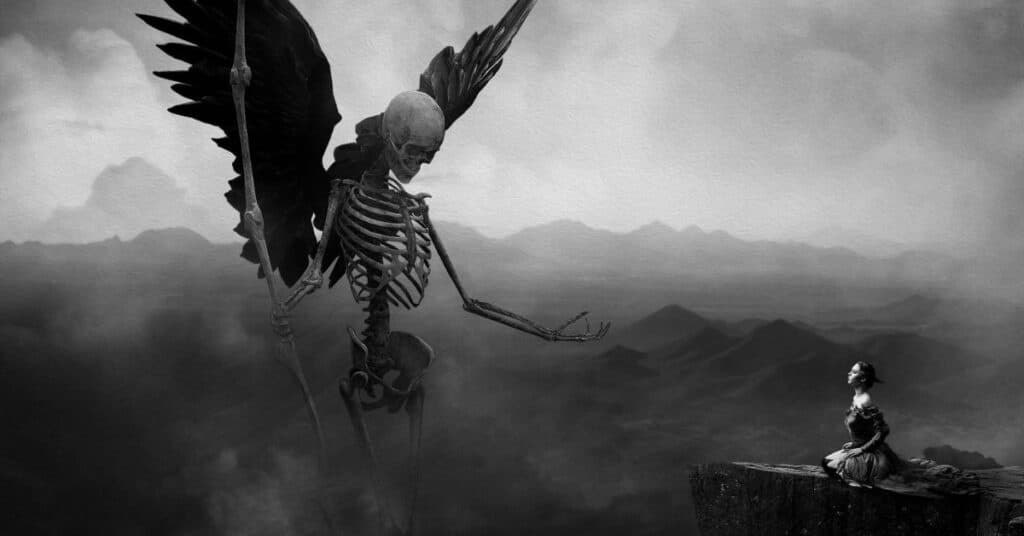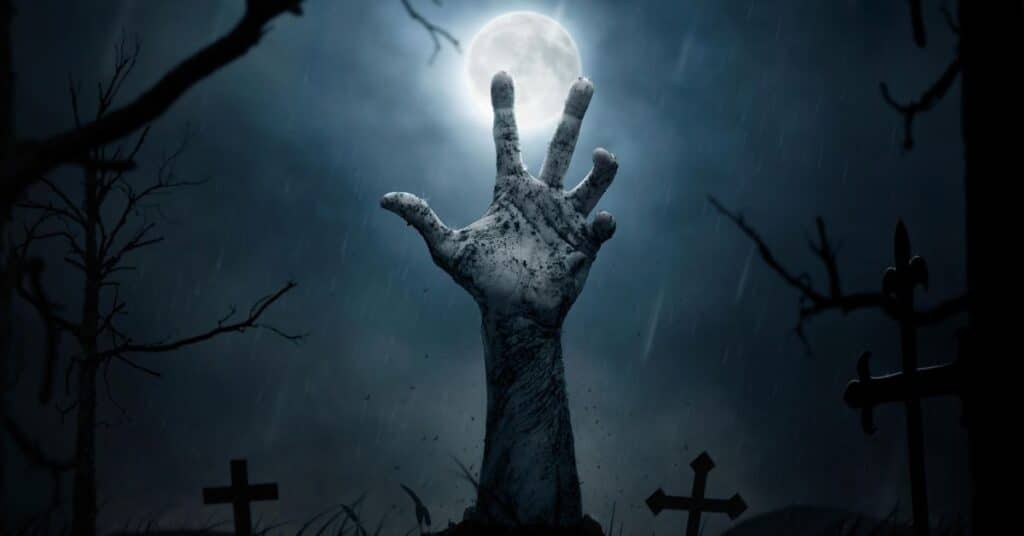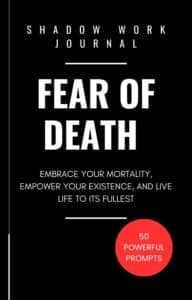Welcome to the realm of the shadows, where the mysteries of life and death intertwine in a dance of profound introspection. In the depths of our being, hidden fears and unexplored emotions lie dormant, waiting to be unearthed and examined. Today, we embark on an extraordinary journey, armed with fifty deep-dive shadow work prompts that will unravel the intricate tapestry of our fear of death.
Death, the enigmatic companion that accompanies us from the moment of our birth until the final breath, has always fascinated and terrified humanity. It is the great unknown, the ultimate mystery that perplexes our minds and leaves us pondering the meaning of our existence. Yet, by diving headfirst into our fears, we open doors to profound self-discovery and transformation.
For centuries, philosophers, theologians, and thinkers of all creeds have grappled with the concept of death. From the ancient Greeks to the existentialists, questions surrounding mortality have propelled us to examine the very essence of our being. Today, armed with these fifty prompts, we follow in their footsteps, delving into the depths of our psyche with the aim of shedding light on our fear of the inevitable.
As we embark on this extraordinary journey, let us remember that shadow work is not for the faint of heart. It requires courage, vulnerability, and a willingness to confront our deepest fears. But rest assured, dear reader, for in the shadows lies the key to liberation and self-acceptance. By exploring our fear of death, we embark on a path of self-discovery, resilience, and ultimately, a renewed appreciation for the beauty and brevity of life.
So, grab a pen and paper, prepare to confront the darkness within, and join us as we navigate the labyrinthine corridors of our minds. Let us challenge our assumptions, question our beliefs, and emerge from this journey transformed, with a newfound understanding of the interconnectedness of life and death.
Embracing Mortality: Understanding the Fear of Death
Death is an inevitable part of the human experience, and yet, it remains one of the most profound and universal fears. The fear of death, also known as thanatophobia, is a complex psychological phenomenon that encompasses a range of emotions, thoughts, and beliefs related to the inevitable end of our existence. In this chapter, we will delve into the concept of fear of death, exploring its origins, manifestations, and potential ways to cope with this existential anxiety.
Defining the Fear of Death
The fear of death can be understood as an emotional response to the awareness and anticipation of one’s own mortality. It is a deeply ingrained fear that arises from the realization that life is finite and that death represents the ultimate unknown. This fear is often accompanied by a sense of dread, anxiety, and a desire to avoid or delay the inevitable.
Origins of the Fear of Death
Self-Preservation Instinct: The fear of death is rooted in our instinct for self-preservation. From an evolutionary perspective, fear serves as a protective mechanism, ensuring our survival by prompting us to avoid potential threats and dangers.
Unconscious Fear of the Unknown: Death is a profound mystery, as it represents a complete cessation of consciousness and an unknown state beyond our comprehension. This fear of the unknown can trigger existential anxiety, as we grapple with questions about what happens after death.
Manifestations of the Fear of Death
Existential Angst: The fear of death often leads to existential angst, a feeling of unease and confusion regarding the meaning and purpose of life. Questions about the afterlife, the existence of a higher power, and the significance of our actions become central concerns.
Anxiety and Avoidance Behaviors: Fear of death can manifest as anxiety, leading individuals to engage in avoidance behaviors to lessen their exposure to reminders of mortality. This can include avoiding discussions about death, refusing to plan for the future, or even developing phobias related to death-related stimuli.
Regret and Unfulfilled Potential: The fear of death can also be linked to a fear of not having lived a meaningful or fulfilling life. Individuals may experience regret for not pursuing their passions, not forming meaningful relationships, or not making a positive impact on the world.
Coping with the Fear of Death
Acceptance and Mindfulness: Embracing the reality of death and cultivating mindfulness can help individuals confront their fears and live in the present moment. By acknowledging the impermanence of life, one can find a greater appreciation for the preciousness of each day.
Finding Meaning and Purpose: By discovering and pursuing activities, relationships, or causes that align with one’s values and passions, individuals can find a sense of purpose and fulfillment that can mitigate the fear of death.
Seeking Support: Sharing one’s fears and anxieties about death with trusted loved ones or seeking professional help can provide emotional support and guidance in navigating the existential challenges associated with the fear of death.
The fear of death is a deeply rooted and complex psychological phenomenon that is inherent to the human condition. However, by understanding the origins and manifestations of this fear, as well as exploring strategies for coping with it, individuals can begin to embrace their mortality and live more fully in the present moment. Remember, the fear of death is a reminder of the preciousness of life, and by confronting and accepting it, we can find deeper meaning, purpose, and appreciation for the limited time we have.

Embracing the Shadows: Transforming your Fear of Death through Shadow Work
Fear of death is a universal experience that can haunt us throughout our lives. It is an existential fear that often remains hidden in the shadows of our consciousness. However, by engaging in the practice of shadow work, we can confront and transform this fear, unlocking a newfound sense of freedom and peace. In this chapter, we will explore the transformative benefits of shadow work for our fear of death, delving into its profound potential to heal and empower us. So, are you ready to embark on a journey of self-discovery and transformation?
Understanding Shadow Work
Before we dive into the transformative benefits of shadow work, let’s first define what it entails. Shadow work is a psychological practice rooted in the teachings of Carl Jung, which involves exploring and integrating the unconscious aspects of our personality. These unconscious aspects, known as the shadow, consist of repressed emotions, desires, and beliefs that we may find uncomfortable or unacceptable. By acknowledging and embracing these shadows, we can bring them into the light of our consciousness, leading to personal growth and self-awareness.
Fear of Death: A Pervasive Human Experience
The fear of death is a deeply ingrained aspect of the human condition. It arises from our innate desire for self-preservation and the uncertainty surrounding what lies beyond the threshold of life. This fear can manifest in various ways, such as anxiety, avoidance, or existential crisis. However, by shining a light on our fear of death through shadow work, we can uncover its underlying causes and transform it into a catalyst for personal growth and acceptance.
Confronting Mortality: Embracing Impermanence
Shadow work allows you to confront your mortality head-on, challenging you to examine your beliefs and attitudes towards death. By exploring your fears, regrets, and unfulfilled desires, you can gain a deeper understanding of what truly matters to you in life. This process can shift your perspective, helping you embrace the impermanence of existence and live more fully in the present moment. By acknowledging your mortality, you can find the motivation to pursue your passions, deepen your relationships, and make the most of the time you have.
Transcending the Ego: Dissolving the Illusion of Self
Shadow work also offers an opportunity to transcend the limitations of the ego, which is often driven by the fear of death. By exploring and integrating your shadow, you can dismantle the illusion of a fixed and separate self, opening up to a more expansive and interconnected understanding of existence. This dissolution of the ego can bring about a sense of liberation from the fear of death, as you realize that your true essence extends beyond the boundaries of your physical being.
Cultivating Inner Resilience: Embracing the Unknown
Engaging in shadow work cultivates inner resilience, enabling you to face the unknown with courage and acceptance. By exploring your fears and vulnerabilities, you develop a deeper sense of self-trust and inner strength. This newfound resilience allows you to navigate the uncertainties of life and death with grace, embracing the mystery that lies beyond the threshold.
Shadow work offers a transformative path towards healing and empowerment, particularly when it comes to addressing the fear of death. By embracing your shadows, confronting your mortality, transcending the ego, and cultivating inner resilience, you can transform your fear into a catalyst for growth, acceptance, and a more meaningful existence. So, are you ready to embark on this journey of self-discovery and transformation, unlocking the profound benefits of shadow work? Remember, the time to embrace your shadows and transcend your fear of death is now.

Shadow Work Prompts to Explore Your Fear of Death
Contemplate on your earliest memory of understanding death. How has this shaped your perspective of mortality?
Explore the question: “What does death mean to you?” How does this definition affect your daily life and decisions?
Consider your past experiences with death. How have these instances influenced your fear of death?
Think about your spiritual beliefs. How do they shape your view on death and the fear associated with it?
Delve into the thought: “Is your fear of death more about the process of dying or about what comes after?”
Reflect on the idea of your own mortality. How does it make you feel and why?
Ponder upon the question, “What would you do differently if you knew your time was limited?”
Consider the finite nature of life. Does this make life more precious or more terrifying for you?
What aspects of your life would you focus on if you had only a year left to live?
Unearth the reasons behind your fear of death. Are they rational or rooted in the unknown?
Reflect on the things you have yet to accomplish. Does the fear of death intensify with this realization?
Ponder on the thought: “Does death signify an end or a new beginning to you?”
Reflect on the idea of leaving loved ones behind. Is this a significant part of your fear of death?
Do you fear death less if you believe in an afterlife? Why or why not?
Has the fear of death stopped you from pursuing certain experiences or risks in life?
Explore the concept of legacy. How does the idea of leaving behind a lasting impact affect your fear of death?
How has your culture’s view of death influenced your own fear of it?
Investigate your feelings about growing older. Does aging exacerbate your fear of death?
Explore the relationship between your physical health and your fear of death. Are they related?
How does your fear of death affect your relationships and how you express love?
Think about the idea of existence. Does death represent the cessation of existence to you?
Reflect on your experiences of loss. How have these encounters influenced your feelings about death?
Think about the act of saying goodbye. Does this stir up fear of your own mortality?
Ponder on the concept of time. Does the ticking clock invoke fear of death?
How do narratives of near-death experiences influence your fear of death?
How does the idea of pain and suffering connected to death contribute to your fear?
Reflect on the idea of reincarnation. Does this belief alleviate your fear of death?
Explore the question: “Do you believe in a predetermined fate or destiny when it comes to death?”
Reflect on your life’s purpose. Does fulfilling it decrease your fear of death?
Ponder the possibility of death being a peaceful transition rather than a fearful end.
Does your fear of death change when you think of it as a natural part of life’s cycle?
How does the fear of death affect your mental health?
Reflect on the idea of memory. Does the fear of being forgotten after death intensify your fear of it?
Ponder the concept of non-existence. Is this what fuels your fear of death?
Explore the question: “What would you miss the most about life if you knew death was imminent?”
Reflect on your personal growth. Does the process of evolving and becoming a better person reduce your fear of death?
Ponder the concept of leaving unfinished business. Does this contribute to your fear of death?
How does the fear of death influence your career choices or life goals?
Reflect on the idea of control. Does the unpredictability of death contribute to your fear?
Explore the question: “Does the fear of death make us love more intensely?”
Think about the experiences you haven’t had yet. Does the thought of missing out intensify your fear of death?
Reflect on the idea of solitude. Does the fear of dying alone scare you?
Ponder the concept of acceptance. Can accepting death as inevitable reduce your fear of it?
How does the fear of death affect the way you value time and moments in life?
Explore the question: “Does the fear of death lead to a deeper appreciation of life?”
Reflect on the idea of regrets. Does the fear of having regrets at the end of life enhance your fear of death?
Ponder the concept of living fully. Can embracing life in its entirety mitigate your fear of death?
Explore the question: “How does the fear of death impact your spiritual journey?”
Reflect on the idea of consciousness. Does the fear of losing consciousness contribute to your fear of death?
Ponder the concept of the unknown. Is the uncertainty of what lies beyond death the root of your fear?
Shadow Work Journal to Explore Your Fear of Death
50 Shadow Work Prompts to Embrace Your Mortality, Empower Your Existence, and Live Life to its Fullest

The fear of death is an inevitable part of the human condition. It’s a deep-seated dread that often lurks in the shadows of our subconscious, making us anxious, restless, and even fearful of fully living. This fear can be paralyzing, limiting our potential and preventing us from truly embracing life’s possibilities. It’s a constant and silent companion that can lead us into a perpetual state of worry, diminishing our enjoyment of the present and causing us to retreat from life instead of engaging with it.
Ignoring this fear doesn’t make it go away. It only intensifies, gradually seeping into every aspect of our lives, casting a long, dark shadow over our existence. It can lead to existential crises, chronic anxiety, sleepless nights, and even physical health issues. The longer we avoid confronting this fear, the more control it gains over us, crippling our capacity to live fully and joyfully. It distorts our perception of life, turning it into a ticking clock, instead of an open field of infinite possibilities.
The “Shadow Work Journal to Explore Your Fear of Death” is a powerful tool designed to help you confront and understand your fear of death, and turn it into a source of strength and resilience. This journal takes you on a journey of self-discovery, guiding you through a series of reflective prompts that help you delve deep into your subconscious and shine a light on your deepest fears.
Benefits of Using the Shadow Work Journal
Self-discovery and Understanding
By putting pen to paper, you’ll uncover the root causes of your fears, understanding their origins, and how they impact your life. This understanding is the first step towards coming to terms with your mortality and transforming your fear into a motivator for living a purposeful and fulfilling life.
Promoting Mindfulness and Present Living
This journal guides you towards mindfulness, encouraging you to live in the present moment. It helps you realize that the fear of death often robs us of our present joy and peace. By learning to live in the ‘now,’ you can reclaim your life from the clutches of this fear.
Building Resilience and Empowerment
By confronting your fear of death, you’ll build emotional resilience and cultivate a newfound sense of empowerment. Your fear no longer controls you; instead, it becomes a catalyst for personal growth and self-improvement.
Embrace Your Journey with the Shadow Work Journal
It’s time to step out of the shadows of your fear and into the light of understanding and acceptance. The “Shadow Work Journal to Explore Your Fear of Death” is not just a book, but a companion on your journey towards embracing your mortality and living life to its fullest. By delving into this journal, you’re taking the first step towards freeing yourself from the chains of fear and opening yourself to a life full of joy, peace, and fulfillment.
As we bid farewell to the shadows and return to the realm of the living, let us carry with us the wisdom and insights gained from our deep-dive into the fear of death. Our journey has been one of self-reflection, unraveling the intricate threads of our consciousness and confronting the existential questions that lie at the core of our existence.
Through shadow work, we have come face to face with our mortality, acknowledging our fear while also embracing the beauty and fragility of life. We have explored the depths of our souls, unearthing buried emotions and hidden traumas, and in doing so, we have grown stronger, more resilient, and more at peace with the inevitable.
But as we emerge from the depths of introspection, let us not forget the purpose of our journey. The fear of death, though universal, is not meant to paralyze us, but rather to inspire us to live fully and authentically. It is a reminder that our time on this earth is limited, and every moment is a precious gift. So, dear reader, as you continue on your path, I leave you with a thought-provoking question to ponder:
What will you do with the time you have been given, knowing that death is but a whisper away?

